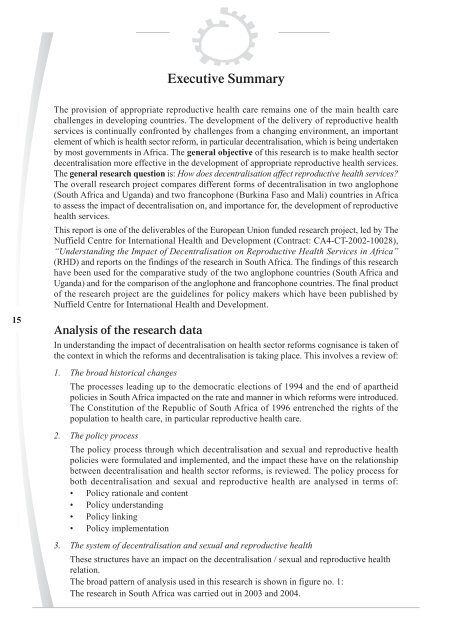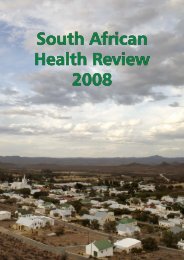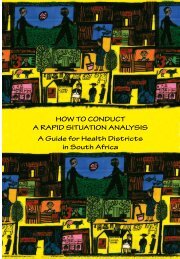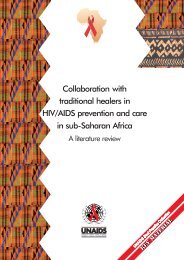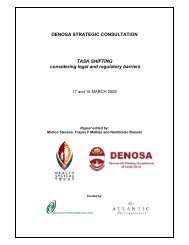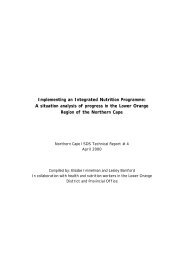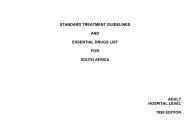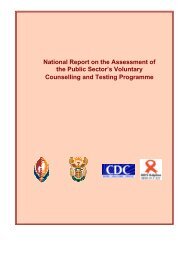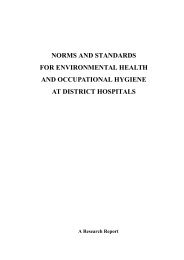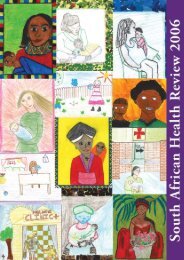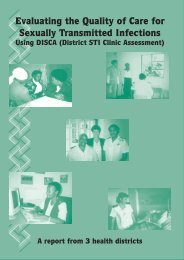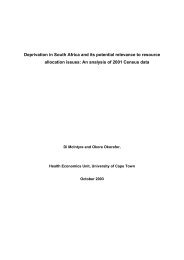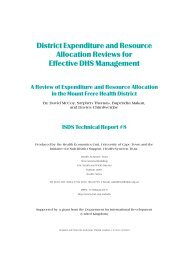- Page 1 and 2: UNDERSTANDING THE IMPACT OF DECENTR
- Page 3 and 4: Contents Figures and Tables Abbrevi
- Page 5 and 6: Chapter 9: Planning, Monitoring and
- Page 7 and 8: Figure 4.1: Generic Health District
- Page 9 and 10: Figure 7.17: Klerksdorp, Mafikeng a
- Page 11 and 12: Table 3.1: Policy, Legislation and
- Page 13 and 14: GDP Gross Domestic Product GEAR Gro
- Page 15: x Acknowledgements The Understandin
- Page 19 and 20: the responsibility of National Chie
- Page 21 and 22: Although planning within the Nation
- Page 23 and 24: each year. The macro-economic trend
- Page 25 and 26: Building and maintenance of infrast
- Page 27 and 28: 1.2 Decentralisation and reproducti
- Page 29 and 30: legislation are designed to unify t
- Page 31 and 32: consultation with the National Depa
- Page 33 and 34: Chapter 2 Context of Decentralisati
- Page 35 and 36: The RDP White Paper was released in
- Page 37 and 38: The committees are required to hold
- Page 39 and 40: of government organs and health ser
- Page 41 and 42: “Let me start with the national d
- Page 43 and 44: There was political turmoil in the
- Page 45 and 46: Figure 2.3: North West Province - P
- Page 47 and 48: Within each health district there i
- Page 49 and 50: 2.4. North West Local Level The loc
- Page 51 and 52: There are varying numbers of mobile
- Page 53 and 54: 2.4.1.2 Klerksdorp Health District
- Page 55 and 56: • Water source - in dwelling 27.6
- Page 57 and 58: The province and the local municipa
- Page 59 and 60: Figure 2.11: Klerksdorp Health Dist
- Page 61 and 62: Mafikeng is the seat of the provinc
- Page 63 and 64: • Light sources - electricity 71.
- Page 65 and 66: Table 2.10: Mafikeng Health Distric
- Page 67 and 68:
Figure 2.16: Mafikeng Health Distri
- Page 69 and 70:
Political representation in the hea
- Page 71 and 72:
Figure 2.19: Ganyesa Health Distric
- Page 73 and 74:
Table 2.16: Ganyesa Health District
- Page 75 and 76:
Table 2.18: Summary Comparative Tab
- Page 77 and 78:
Figure 2.1b: National Department of
- Page 79 and 80:
3.1 Historical Background Chapter 3
- Page 81 and 82:
80 Reconstruction and Development P
- Page 83 and 84:
Table 3.1: Policies, Legislation an
- Page 85 and 86:
Of note is that policy for decentra
- Page 87 and 88:
Department of Provincial and Local
- Page 89 and 90:
“Definitely, at least that is the
- Page 91 and 92:
3.4 Health Decentralisation Policy
- Page 93 and 94:
The process of establishing health
- Page 95 and 96:
The MEC for Health in the NW Provin
- Page 97 and 98:
3.5 Conclusion This chapter provide
- Page 99 and 100:
As Pillay and Bond have described,
- Page 101 and 102:
“Yes in a way they (the NDoH) are
- Page 103 and 104:
“… people are becoming much mor
- Page 105 and 106:
Preparation of the local level to a
- Page 107 and 108:
Purchase of contraceptives should r
- Page 109 and 110:
The new policies from national, bas
- Page 111 and 112:
voluntary counseling and testing we
- Page 113 and 114:
The ADCHS, who has resided and work
- Page 115 and 116:
Figure 4.2: Klerksdorp Health Distr
- Page 117 and 118:
The Klerksdorp Provincial Hospital
- Page 119 and 120:
Teenage pregnancy rate, as in all d
- Page 121 and 122:
Other reproductive health indictors
- Page 123 and 124:
“… increase nursing staff and a
- Page 125 and 126:
Financial Accessibility to reproduc
- Page 127 and 128:
A lack of privacy in the clinic is
- Page 129 and 130:
“Yes, like the intrauterine devic
- Page 131 and 132:
The total number of deliveries in t
- Page 133 and 134:
The increase in number of referrals
- Page 135 and 136:
The still birth rate has remained b
- Page 137 and 138:
we refer them to the hospital. We m
- Page 139 and 140:
Province. There are, however, probl
- Page 141 and 142:
In reality there are probably many
- Page 143 and 144:
Contraceptive services / Family pla
- Page 145 and 146:
The number of deliveries at the cli
- Page 147 and 148:
Figure 4.23: Ganyesa Health Distric
- Page 149 and 150:
Table 4.3: Ganyesa Health District
- Page 151 and 152:
The delay experienced by patients i
- Page 153 and 154:
But if there are problems she can b
- Page 155 and 156:
Financial Accessibility to reproduc
- Page 157 and 158:
Figure 2.25 compares the maternal m
- Page 159 and 160:
Figure 4.29: Public Institution Neo
- Page 161 and 162:
allocated to clinic duties for thre
- Page 163 and 164:
Other clinics do not provide separa
- Page 165 and 166:
The surgical termination of a pregn
- Page 167 and 168:
to a clinic for help and had either
- Page 169 and 170:
even other provinces, as they fear
- Page 171 and 172:
Chapter 5 Districts - Context, Dece
- Page 173 and 174:
including family planning. These se
- Page 175 and 176:
Democratic Party (UCDP) lead by Luc
- Page 177 and 178:
The total number of people recorded
- Page 179 and 180:
Summary Table of Districts - Contex
- Page 181 and 182:
Klerksdorp Health District Mafikeng
- Page 183 and 184:
6.1 Introduction Structure and orga
- Page 185 and 186:
4. District Hospital Although not i
- Page 187 and 188:
• Up to R7 500 without contract.
- Page 189 and 190:
Chapter 7 Finances 7.1 Introduction
- Page 191 and 192:
at the same time not increasing the
- Page 193 and 194:
• Budgeting process does not give
- Page 195 and 196:
Figure 7.4: National Trends in Heal
- Page 197 and 198:
Other indicators to be monitored ar
- Page 199 and 200:
udget requirements, including those
- Page 201 and 202:
are budgeted for from general munic
- Page 203 and 204:
“The local government doesn’t [
- Page 205 and 206:
As mentioned previously, funding fo
- Page 207 and 208:
The hospitals are also under funded
- Page 209 and 210:
Figure 7.12: National Health Expend
- Page 211 and 212:
“At the moment there is a drive f
- Page 213 and 214:
There was an average of 2.9 visits
- Page 215 and 216:
Figure 7.18 shows total district po
- Page 217 and 218:
Chapter 8 Human Resources 8.1 Intro
- Page 219 and 220:
The National Strategic Health Plan
- Page 221 and 222:
Figure 8.2: North West Province, De
- Page 223 and 224:
The shortage of health personnel in
- Page 225 and 226:
you say, or how do you control the
- Page 227 and 228:
services are not compromised. Creat
- Page 229 and 230:
Supervisors find it difficult to ca
- Page 231 and 232:
Local Level As much as there is sup
- Page 233 and 234:
Training for Health Workers Trainin
- Page 235 and 236:
training. So the supervisor of that
- Page 237 and 238:
“…when it is said we need someb
- Page 239 and 240:
In Mafikeng Provincial Hospital, wh
- Page 241 and 242:
With the introduction of the PHC ap
- Page 243 and 244:
In the three study sites, a general
- Page 245 and 246:
Managers expressed emphatically the
- Page 247 and 248:
Nurses believe that the patients ha
- Page 249 and 250:
etter than the Youth Centres. The N
- Page 251 and 252:
Problems • Lack of all cadre of s
- Page 253 and 254:
9.2 Planning processes Table 9.1 sh
- Page 255 and 256:
workers as being politically driven
- Page 257 and 258:
Management Information Surveillance
- Page 259 and 260:
Managers are still learning to use
- Page 261 and 262:
“We give every manager a chance t
- Page 263 and 264:
Chapter 10 Governance 10.1 Introduc
- Page 265 and 266:
“It's sort of being delegated by
- Page 267 and 268:
general well being of the staff. Th
- Page 269 and 270:
clarity, they are the only ones who
- Page 271 and 272:
“We are aware that there are lot
- Page 273 and 274:
“They do in terms of saying; let
- Page 275 and 276:
“The Governance Act it is very cl
- Page 277 and 278:
“What I can say is that the impre
- Page 279 and 280:
Some of the members of the youth gr
- Page 281 and 282:
The rural areas around Mafikeng wer
- Page 283 and 284:
marked contrast to the positive imp
- Page 285 and 286:
Ganyesa Health District Management
- Page 287 and 288:
• Youth Centres. These have been
- Page 289 and 290:
Figure 10.2: North West Province -
- Page 291 and 292:
the back-bone of treatment of patie
- Page 293 and 294:
“There will be problem sometimes
- Page 295 and 296:
“The medicine is available all th
- Page 297 and 298:
Community members’ experiences Co
- Page 299 and 300:
extent, alleviate the general short
- Page 301 and 302:
“If maybe most of the people can
- Page 303 and 304:
Service experiences The NHLS offers
- Page 305 and 306:
Information in the Facility Survey
- Page 307 and 308:
“Where there is maintenance they
- Page 309 and 310:
An improvement in ordering of equip
- Page 311 and 312:
are complementary and on down refer
- Page 313 and 314:
“It (the referral system) doesn
- Page 315 and 316:
In contrast in many rural areas, wh
- Page 317 and 318:
fairly good EMS. You see the advant
- Page 319 and 320:
Then 20 mins later a sister calls f
- Page 321 and 322:
a. Reproductive Health and reproduc
- Page 323 and 324:
Implications for reproductive healt
- Page 325 and 326:
• Feeling of ‘distance’ among
- Page 327 and 328:
• decentralisation is constrained
- Page 329 and 330:
Appendix Decentralisation and Repro
- Page 331 and 332:
White Paper on Local Government 199
- Page 333 and 334:
Full Source reference (author, date
- Page 335 and 336:
Full Source reference (author, date
- Page 337 and 338:
Full Source reference (author, date
- Page 339 and 340:
Full Source reference (author, date
- Page 341 and 342:
Full Source reference (author, date
- Page 343 and 344:
Full Source reference (author, date
- Page 345 and 346:
Full Source reference (author, date
- Page 347 and 348:
Full Source reference (author, date
- Page 349 and 350:
Full Source reference (author, date
- Page 351 and 352:
Full Source reference (author, date


